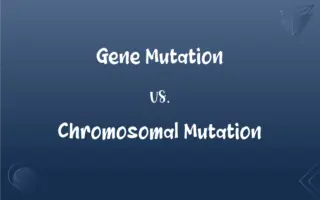Possessive Pronoun vs. Possessive Adjective: What's the Difference?
Edited by Aimie Carlson || By Harlon Moss || Published on December 5, 2023
Possessive pronouns replace nouns (e.g., mine, yours), while possessive adjectives modify nouns (e.g., my, your).

Key Differences
Possessive pronouns are used to indicate ownership and replace nouns, eliminating the need to repeat the noun. For example, "The book is mine." Possessive adjectives, on the other hand, modify nouns and indicate who owns something, as in "My book is on the table."
Possessive pronouns stand alone and function as nouns in a sentence, while possessive adjectives always accompany a noun, modifying it to show possession. An example of a possessive pronoun is "yours," as in "This pen is yours." An example of a possessive adjective is "your," as in "Your pen is blue."
Possessive pronouns help avoid repetition by replacing the noun along with its possessive adjective. For instance, instead of saying "Sarah's car is faster than Rachel's car," one can say "Sarah's car is faster than Rachel's." In contrast, possessive adjectives must be followed by a noun, as in "Her car is fast."
Possessive pronouns include words like "his," "hers," "ours," and "theirs." These do not require a noun to follow. Possessive adjectives include "his," "her," "our," "their," which always precede a noun.
The use of possessive pronouns can simplify sentences and make them more concise, as they replace longer noun phrases. Possessive adjectives, although providing clarity on ownership, cannot stand alone and must be used with a noun.
ADVERTISEMENT
Comparison Chart
Function in a Sentence
Replaces nouns and shows ownership
Modifies a noun to indicate ownership
Examples
Mine, yours, his, hers, ours, theirs
My, your, his, her, our, their
Usage with Nouns
Standalone without following nouns
Always used with a noun
Example in a Sentence
"That book is mine."
"That is my book."
Purpose
To avoid repetition and replace noun phrases
To modify a noun and show possession
ADVERTISEMENT
Possessive Pronoun and Possessive Adjective Definitions
Possessive Pronoun
Possessive pronouns can simplify sentences by avoiding repetition.
The smaller bag is mine.
Possessive Adjective
Possessive adjectives modify nouns to show who owns something.
My phone is charging.
Possessive Pronoun
Possessive pronouns vary according to number and gender.
The winning team's trophy is theirs.
Possessive Adjective
Possessive adjectives provide clarity on ownership.
Our project won the award.
Possessive Pronoun
They function independently in place of noun phrases.
This car isn't hers.
Possessive Adjective
Possessive adjectives agree with the possessor, not the noun possessed.
Your ideas are interesting.
Possessive Pronoun
These pronouns are used to express possession without naming the item again.
These shoes are his.
Possessive Adjective
They precede a noun in a sentence.
Her cat is very friendly.
Possessive Pronoun
Possessive pronouns indicate ownership and replace nouns.
Is this book yours?
Possessive Adjective
These adjectives are essential for indicating possession in relation to a noun.
Their house is on the corner.
FAQs
Are possessive adjectives used alone?
No, they always modify a noun.
Do possessive pronouns vary by number?
Yes, like "mine" (singular) and "ours" (plural).
What does a possessive adjective do?
Modifies a noun to indicate who owns it.
Can possessive pronouns stand alone?
Yes, they replace nouns and do not require a noun after them.
What is a possessive pronoun?
A pronoun that shows ownership and replaces a noun.
Do possessive adjectives indicate specific ownership?
Yes, they clearly show who owns the noun.
Are possessive pronouns gender-specific?
Some, like "his" or "hers," are gender-specific.
Can possessive pronouns be used for inanimate objects?
Yes, like "this is mine."
Are possessive adjectives used in formal writing?
Yes, they are common in all types of writing.
Are possessive adjectives affected by the gender of the noun?
No, they agree with the possessor, not the gender of the noun.
Do possessive pronouns have different forms for objects?
No, they remain the same regardless of the object.
Can possessive adjectives be omitted in a sentence?
Omitting them can change the meaning or clarity of possession.
Can possessive pronouns replace entire noun phrases?
Yes, they are used to avoid repetition.
Do possessive adjectives have a plural form?
No, they remain the same regardless of the noun's number.
Do possessive adjectives have to match the noun in number?
No, they modify the noun but do not change based on its number.
How do possessive adjectives agree in a sentence?
They agree with the possessor, not the noun possessed.
Is there a difference in possessive pronouns between British and American English?
No, they are the same in both.
Can possessive pronouns be subjects in sentences?
Yes, they can function as subjects.
Are possessive pronouns used in casual speech?
Yes, they are commonly used in both formal and informal contexts.
How do possessive adjectives affect sentence structure?
They precede nouns and provide clarity about possession.
About Author
Written by
Harlon MossHarlon is a seasoned quality moderator and accomplished content writer for Difference Wiki. An alumnus of the prestigious University of California, he earned his degree in Computer Science. Leveraging his academic background, Harlon brings a meticulous and informed perspective to his work, ensuring content accuracy and excellence.
Edited by
Aimie CarlsonAimie Carlson, holding a master's degree in English literature, is a fervent English language enthusiast. She lends her writing talents to Difference Wiki, a prominent website that specializes in comparisons, offering readers insightful analyses that both captivate and inform.






































































